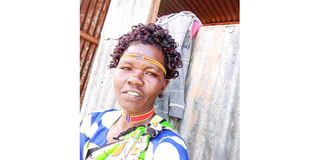Standing up for humanity, a rights defender speaks

Mary Komen. She is advocating the rights of Sengwer community.
What you need to know:
- Ms Mary Komen says occasional evictions had turned into a humanitarian crisis.
- Ms Komen, 45, says women and girls bore the brunt of evictions because when houses were burned down, most of them became victims of sexual violence.
Bothered by occasional eviction of indigenous Sengwer community from Embobut Forest in Elgeyo Marakwet County, Ms Mary Komen took a bold step to remedy an unending crisis.
Ms Komen, 45, said evictions by the government had subjugated families, causing the minority group untold suffering.
“In all this crisis, women and girls suffered the most because when houses were burnt down, a majority of them became victims of sexual violence. They had no one to stand up against the injustices meted out to them because men had wandered off,” she reminisces.
“The girls were married off at a tender age after being subjected to the retrogressive female genital mutilation, which was still very rampant in the area. And with no education, they could not be independent and within no time they had babies that would soon be married off even before celebrating their 15th birthday and the vicious circle continued.”
Ms Komen decided to join Defenders’ Coalition to fight for the rights of the people. This was a decade ago. She says the situation has since been changing, with more girls now joining learning institutions.
“We have successfully sued several pedophiles and some have been jailed for over 10 years. Also, there has been a clamour for land rights and the government cannot just evict people without an alternative land for settling the Sengwer community.”
Change
She says society is beginning to appreciate women's leadership, unlike before when they were treated like children, adding that this is a result of heightened human rights activism.
“Women are now being included in various community committees and their voices are heard. No decree is passed without the input of women, especially on land rights. This is a step in the right direction and we shall soldier on to advocate women rights.”
Ms Komen said that through human rights activism, she, together with others, has successfully blocked billions of shillings, which the government had sourced to rehabilitate Embobut Forest.
“The money, partly, was to be used to evict the Sengwer community from their homes, besides subjecting them to more torture like before. We, as a community, have never been against environmental conservation, but when the funds are used to cause human suffering, then we feel aggrieved,” she says.
The mother of seven states that to keep abreast of her activism work, she had to undergo training, more specifically in women's and children's rights, including land ownership.
“I have been to Cameroon to learn more about indigenous and marginalised communities still living in forests. I have attended several court cases in Tanzania on indigenous people and land rights and this gave me vast experience in my advocacy. I also attended training in Kenya and we now argue from an informed point of view.”
She has also secured a social protection programme under which 40 people aged 60 and above are given a monthly stipend of Sh5,000. But her work, despite winning the 2020 human rights defender of the year, has been curtailed by inadequate funds, which are sourced through the organisation.
“A lot of advocacy is still needed on gender issues, as well as land rights, but you cannot do much because you access little money. Rural communities need emancipation on various issues; on several occasions, I have been holding radio talk shows to educate the public on issues that affect them.”
Her work has also been curtailed by society, which maligns her because of the advocacy work, sometimes abusing her.
“We have been branded derogatory names, which, sometimes, is spiteful and we have been nicknamed. There have also been threats, especially from suspects, and even when we seek police protection, we are never accorded any,” she says.





